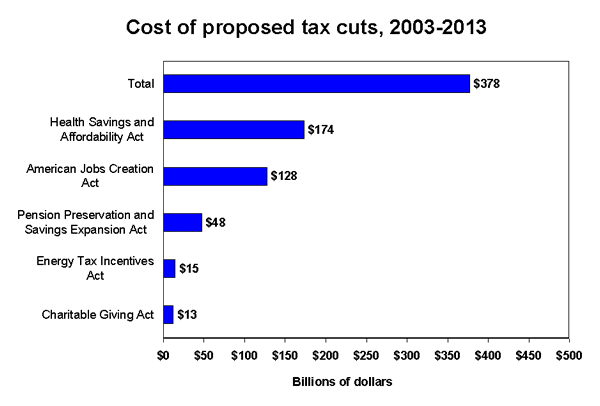Snapshot for September 24, 2003.
Proposed tax cuts ignore budget deficits
Notwithstanding the radical deterioration of the federal budget outlook, assorted members of Congress are preparing a wide variety of new and expensive tax cuts. Although some will label these cuts good policy and others will call them corporate welfare, what is beyond dispute is that the cuts are being considered with no thought to their consequences for budget deficits. None of the cuts are “paid for” with offsetting revenue-raising measures.

The figure shows the cumulative cost of the tax cuts in five of the most popular areas:
- Charitable Giving Act—The first bar at the bottom of the chart shows the cost of a bill proposing an expanded tax cut for charitable giving, with a price tag of $13 billion (all amounts referred to here and below apply to the period between 2003 and 2013). This type of deduction for charitable giving made available to non-itemizers would be impossible for the Internal Revenue Service to administer because misreporting could be done with impunity. The chances of being audited and strongly penalized would be negligible.
- Energy Tax Incentives Act—This $15 billion grab bag of tax cuts is being promoted under the general cause of energy security and as a response to this year’s power blackouts.
- Pension Preservation and Savings Expansion Act—The third bill deals with the cost of expanded tax benefits for workers fortunate enough to have pensions and IRAs, estimated at $48 billion. However, this bill would have limited value for lower income workers.
- American Jobs Creation Act—Also included in the proposed tax cuts are corporate tax cuts in the amount of $128 billion, which are justified as a cure for the hemorrhage of manufacturing jobs. However, a new EPI Briefing Paper finds that the problems of manufacturing like elsewhere, such as with the negative effect of the overvalued dollar (Bivens, Weller, and Scott 2003).
- Health Savings Affordability Act—Finally, there is a large new health savings account tax deduction that would primarily allow higher-income persons to shelter more of their income, with a total cost of $174 billion.
The proposed tax cuts outlined here add up to $378 billion, and this list is not exhaustive. Meanwhile, relief for families with children—the Relief for Working Families Tax Act of 2003, which expands the Child Tax Credit and includes revenue-raising provisions that prevent any adverse effect on the deficit—is stalled in Congress.
Source: Bivens, J., C. Weller, and R. Scott. 2003. Mending Manufacturing. Economic Policy Institute, Briefing Paper No. 144.
Today’s snapshot was written by EPI economist Max B. Sawicky.
Check out the archive for past Economic Snapshots.
